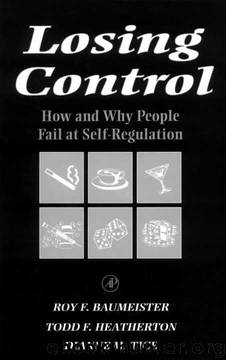Losing Control: How and Why People Fail at Self-Regulation by Roy F. Baumeister;Todd F. Heatherton;Dianne M. Tice

Author:Roy F. Baumeister;Todd F. Heatherton;Dianne M. Tice
Language: eng
Format: mobi
Published: 2009-04-23T20:26:00+00:00
A concept related to the tension-reducing effects of alcohol has been referred to as "stress-response dampening" (Levenson, Sher, Grossman, Newman, & Newlin, 1980). This theory suggests that alcohol selectively interferes with the processing of threat cues, such that environmental stressors no longer pack the same punch when someone has been drinking. In a major review of this literature, Sayette (1993) noted a number of important findings that indicate drinking in order to reduce stress may he a form of misregulation. Thus, research has demonstrated that alcohol is more likely to dampen stress responses when it is consumed before the stressor than when consumed after the stressor (Farha & Sher, 1989). Sayette proposes that consuming alcohol following the stressor may even increase stress responses. This implies that one needs to be drunk before the distressing experience if alcohol is to help. However, most people who use alcohol to influence mood have a few drinks following the distressing experience. Thus, again, the use of alcohol to combat stress is often a form of misregulation.
Another implication of stress-response dampening for misregulation is that alcohol essentially makes people fearless. Since alcohol interferes with processing of threat cues, intoxicated individuals fail to pick up on danger cues or other indications of appropriate behavior. For example, they may fail to notice their spouse is ready to leave them, their boss is ready to fire them, or the police officer is ready to haul them off to jail. Moreover, they may engage in life-threatening behaviors (such as drinking and driving) because they fail to see the personal threat to safety.
Threats to Self-Esteem
Although the use of alcohol for relaxation and tension reduction is well known, the relation between consumption of alcohol and self-esteem is less understood. Specifically, it appears that one motive to consume alcohol may be that it protects or enhances positive self-evaluations.
It has been suggested that one reason that individuals may drink is to create attributional ambiguity regarding their performance. That is, Berglas and Jones (1978; also Jones & Berglas, 1978) proposed that people may be motivated to drink as a self-handicapping strategy. When people fail at an important task, their self-esteem is threatened. However, if they can attribute failure to some other non-self-relevant factor (such as lack of practice) then self-esteem is protected (Tice, 1991). Thus, individuals may consume alcohol before an im portant performance task because if they failed they would he able to blame the failure on the alcohol rather than on themselves. Indeed, at least one study has shown that men use alcohol as a self-handicapping strategy (Tucker, Vuchinich, Sobell, & Maisto, 1980).
Download
This site does not store any files on its server. We only index and link to content provided by other sites. Please contact the content providers to delete copyright contents if any and email us, we'll remove relevant links or contents immediately.
The Art of Thinking Clearly by Rolf Dobelli(9846)
Mindhunter: Inside the FBI's Elite Serial Crime Unit by John E. Douglas & Mark Olshaker(8667)
Change Your Questions, Change Your Life by Marilee Adams(7342)
Nudge - Improving Decisions about Health, Wealth, and Happiness by Thaler Sunstein(7215)
Mastermind: How to Think Like Sherlock Holmes by Maria Konnikova(6910)
The Power of Now: A Guide to Spiritual Enlightenment by Eckhart Tolle(5308)
Men In Love by Nancy Friday(4946)
Altered Sensations by David Pantalony(4845)
Factfulness: Ten Reasons We're Wrong About the World – and Why Things Are Better Than You Think by Hans Rosling(4474)
The Confidence Code by Katty Kay(4010)
Thinking in Bets by Annie Duke(3982)
Man and His Symbols by Carl Gustav Jung(3823)
The Worm at the Core by Sheldon Solomon(3307)
Why Buddhism is True by Robert Wright(3270)
Three Women by Lisa Taddeo(3261)
Liar's Poker by Michael Lewis(3201)
Descartes' Error by Antonio Damasio(3152)
The Inner Life of Animals by Peter Wohlleben(3088)
The Power of Mindful Learning by Ellen J. Langer(3066)
